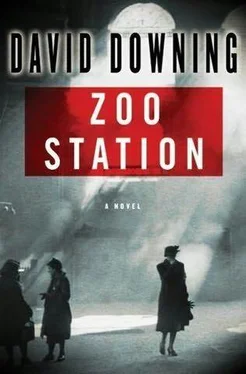David Downing - Zero Station
Здесь есть возможность читать онлайн «David Downing - Zero Station» весь текст электронной книги совершенно бесплатно (целиком полную версию без сокращений). В некоторых случаях можно слушать аудио, скачать через торрент в формате fb2 и присутствует краткое содержание. Жанр: Шпионский детектив, на английском языке. Описание произведения, (предисловие) а так же отзывы посетителей доступны на портале библиотеки ЛибКат.
- Название:Zero Station
- Автор:
- Жанр:
- Год:неизвестен
- ISBN:нет данных
- Рейтинг книги:5 / 5. Голосов: 1
-
Избранное:Добавить в избранное
- Отзывы:
-
Ваша оценка:
- 100
- 1
- 2
- 3
- 4
- 5
Zero Station: краткое содержание, описание и аннотация
Предлагаем к чтению аннотацию, описание, краткое содержание или предисловие (зависит от того, что написал сам автор книги «Zero Station»). Если вы не нашли необходимую информацию о книге — напишите в комментариях, мы постараемся отыскать её.
Zero Station — читать онлайн бесплатно полную книгу (весь текст) целиком
Ниже представлен текст книги, разбитый по страницам. Система сохранения места последней прочитанной страницы, позволяет с удобством читать онлайн бесплатно книгу «Zero Station», без необходимости каждый раз заново искать на чём Вы остановились. Поставьте закладку, и сможете в любой момент перейти на страницу, на которой закончили чтение.
Интервал:
Закладка:
He introduced himself, and her face changed. “Come in,” she said. “You’ve heard?” she added.
“About Dr. Wiesner’s death? Yes. Half an hour ago, at the British Embassy.”
As he spoke, Marthe Wiesner emerged from the other room, closing the door behind her. “Herr Russell…” she began.
“I can’t tell you how sorry I am to hear about your father,” he said. There were two broken table lamps on the wooden chest, he noticed, and the curtain rail was hanging at an awkward angle.
“Thank you,” she said stiffly. She seemed calm-almost overly so-but for the moment at least the light in her eyes had gone out. “This is Sarah Grostein,” she said, introducing the other woman. “She’s an old friend of the family. Mother is… well, you can imagine. The shock was terrible. For all of us, of course. Mother and Ruth are sleeping at the moment.”
“Please give her my condolences,” Russell said, the hollow words tripping off his tongue like… He wondered whether to leave the safety deposit box key with Marthe, especially in the presence of a stranger. He decided against. “I need to talk to your mother,” he said. “Not now, of course,” he added quickly. “I’ll come at the usual time on Friday.”
Marthe nodded, just as the sound of wailing erupted in the other room. A few second later Eva Wiesner called her elder daughter’s name. “I must go…”
“Of course.” He waited until the door had closed before asking Sarah Grostein when the family had heard of Felix Wiesner’s death.
“Saturday evening,” she said. “I wasn’t here of course, but the police behaved abominably. I can understand why Albert lost his head.”
Russell’s heart sunk. “What did he do?”
“Oh, don’t you know? He attacked the Gestapo bastard, hit him with one of these table lamps. The man’s in the hospital. They said he might die, but Marthe says it didn’t look that bad. I think they were just trying to scare Eva.”
“Where have they taken Albert?” he asked. The wailing was quieter, but just as insistent.
She gave a bitter laugh. “They haven’t. He got away. Pushed the other bastard over the sofa and ran for it. He got out the back-there’s a maze of alleys out there-and the conscious one knew better than to follow him. He wouldn’t have found Albert, and he knew damn well he might not come out again.
“Where’s Albert now?”
“No one knows,” she said, leaving Russell with the distinct impression that she was lying. “They came back yesterday,” she went on. “Shouted at Eva to tell them where he was, which she couldn’t have told them if she’d wanted to. But they didn’t arrest her. Maybe they realized that there was no one else to look after the girls, that they’d be up to their eyes in paperwork if they tried to send them away somewhere.”
“Maybe,” Russell agreed. He thought it more likely that the British expression of interest in Wiesner’s fate had kept the Gestapo in check. “Can you pass on a message to Frau Wiesner? Tell her…” He paused. “I was going to say that it looks like the children will get British visas in the next week or so, but it doesn’t seem as though Albert will have any use for his. If he goes to the Germans for an exit visa, they’ll just arrest him. Still, the girls should be able to go. And maybe their mother, too.”
“She won’t leave Albert.”
“Perhaps he can persuade her.”
“Perhaps. But the Gestapo are parked outside, which makes arranging meetings rather difficult.”
He looked at her, standing there with arms crossed and anger simmering behind her eyes. “Are you trying to get out?” he asked.
“Not at present,” she said, in a tone that didn’t invite questioning.
“I’ll get going,” he said. “I’ll be back on Friday morning.”
She nodded, opened the door, and closed it behind him. He walked out to the car, ignoring the watching police, and drove it slowly down Neue Konigstrasse toward the city center. He knew there was nothing more he could do, but that knowledge did nothing to diminish the feelings of anger and helplessness which dogged him through the rest of that day and the next. By the time he entered the British Embassy on Friday morning he felt ready to explode, but equally certain that murdering anyone other than Hitler would only make matters worse.
British entry visas for the three Wiesner children were waiting on Unsworth’s desk, but Unsworth had the decency not to be too pleased with himself. “I’ve found out why the mother’s been refused,” he told Russell. “The intelligence people have quite a dossier on her. She was a Spartacist-you know what they were? Of course you do. Apparently they grade communists out of ten, and anyone scoring over seven is refused immigration. Eva Wiesner’s an eight.”
Russell was astonished. “How recent is this information?”
“It isn’t. The dossier has nothing later than 1919, so she probably gave up politics when she got married. But that won’t help her. An eight’s an eight-that’s what their man told me…”
“Trelawney-Smythe?”
“You’ve met him. No exceptions, he said.”
Russell didn’t know whether to laugh or cry. “I don’t suppose it matters,” he said, before explaining about Albert.
Half an hour later he was back in Friedrichshain. This time Frau Wiesner opened the door, and managed a slight smile as she let him in. After brushing aside his condolences, she sat him down and made them both coffee. “He was a wonderful man,” she said. “And nothing can take that away from him, or from me.”
He gave her the British entry visas for the three children, and explained why she was being refused.
She smiled sadly at that. “I thought that must be the reason,” she said, “but it doesn’t matter now. Take this back,” she added, handing over Albert’s visa. “Someone else can take his place.”
He also gave her the safety deposit box key, and a piece of paper containing two names and addresses. “This is the bank where the box is, and this is my agent in London, Solly Bernstein. Get the girls to memorize it all, and then burn it,” he said. “And I think it would probably be safer for you to keep the key yourself. Solly has another one, and they can use that when they get to London.”
She stared at the writing, as if it were in a foreign language.
“Have you seen Albert?” he asked.
She shook her head. “But he’s all right.”
After leaving effi at the studio early the next morning, he took the car back to her street and walked to Zoo Station. With an hour to wait for the Warsaw train, he had breakfast in the buffet before climbing up to the eastbound platforms. It was the first time, he realized, that he’d been up there since McKinley’s death. He had no idea where the American had gone under his train, and a morbid search for telltale signs came up empty. If there was one thing at which the Germans were good, it was cleaning up after themselves.
He put five pfennigs in a toasted almond machine, and walked down the platform eating from his cupped hand. It was a misty morning, the trees in the Tiergarten fading by stages into nothing. Some geese flew across the glass dome of the station, squawking noisily, heading God-knew-where for late February. There were few finer sights, Russell thought, as their V-formation curled and furled like a banner in the wind. He remembered the seagulls at the Bismarck launching, and laughed out loud.
The Warsaw train arrived, empty save for the few who had boarded at Charlottenburg. Russell found his seat by the time it reached Friedrichstrasse, and dropped off to sleep as the last of the southeastern suburbs slid past his window. Dimly aware of the stop at Frankfurt-am-Oder, he was roused by officialdom for the customs stops on either side of the Polish border, and spent the rest of the journey staring out of the restaurant car window. A wintry sun had finally burned off the mists, and the rye and potato fields of Prussia’s lost province stretched away into the distance, interrupted only by the occasional dirt-track or farm, the odd meandering stream.
Читать дальшеИнтервал:
Закладка:
Похожие книги на «Zero Station»
Представляем Вашему вниманию похожие книги на «Zero Station» списком для выбора. Мы отобрали схожую по названию и смыслу литературу в надежде предоставить читателям больше вариантов отыскать новые, интересные, ещё непрочитанные произведения.
Обсуждение, отзывы о книге «Zero Station» и просто собственные мнения читателей. Оставьте ваши комментарии, напишите, что Вы думаете о произведении, его смысле или главных героях. Укажите что конкретно понравилось, а что нет, и почему Вы так считаете.












